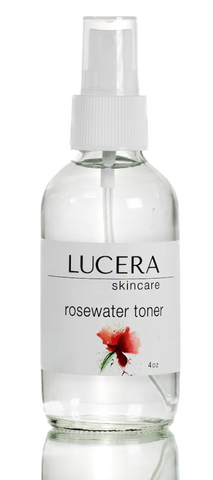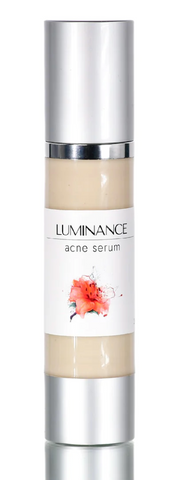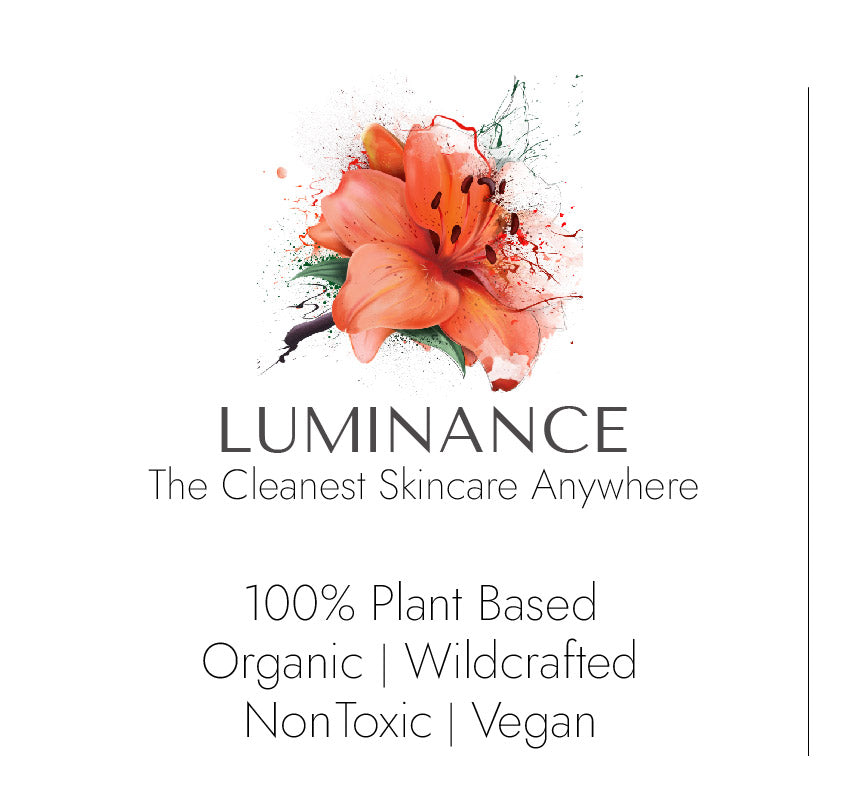How to Control Your Acne Without Long Term Damage to Your Skin or Body.
First and foremost, please do not take Accutane! This is so important, I've provided a link to a paper on the many dangers associated with this medication, specifically birth defects in children you may someday plan to have. Even with all the evidence of serious and dreadful side effects to the children of mothers who took this medication, it is still being prescribed by physicians. Please read this paper to learn more: Accutane Side Effects
Control Your Acne in 5 Steps—But First, A Little Background
The first thing we wish to stress is perhaps the misconception that products containing oils are bad for acne prone skin. Nothing could be further from the truth. For thousands of years, in cultures from all over the world, plant-based oils have been used to deeply penetrate and cleanse skin. It is only in recent history that the use of oils for skincare has been wrongly dismissed.
You can safely and effectively manage your acne prone skin using many of the same techniques and products as one would care for "normal" skin. There are just a few extra precautions that you will need to take to bring your acne prone skin into a healthy balance. So, when your acne passes and your skin is balanced and happy, you really should continue caring for your skin in much the same manner.
This discussion will outline our extremely straightforward skin care routine that applies to all skin types: Acne Prone, Mature, Youthful, Dry, and Hypersensitive. The steps are pretty much the same and with the same underlying idea that your skin should be treated extremely gently, with kindness, and with products that truly help your skin to be healthy and glowing. This is true of acne prone skin and all other skin types. And then, with acne prone, you should take a few extra steps to be gentle and use an appropriate serum.
Step 1: Gently Cleanse Twice Daily with a Plant Based pH Balanced Soap
A natural pH balanced facial cleanser is the best way in the world to gently and deeply cleanse your skin. Regardless of skin type, proper cleansing is just about the single most important thing you can do for your skin. Be gentle and avoid harsh cleansers that contain tightening alcohols, peroxides, and astringents.
Be careful that you're using a real pH balanced soap and that you're not using a harsh synthetic detergent cleanser. If you see anything on the label you don't recognize, be cautious. If it contains alcohol, peroxide, or any kind of astringent, just don't use it.
Learn More About Facial Cleansing
Step 2: Balance the pH of Your Skin with a Floral Water Toner
The purpose of a toner is to bring the pH of your skin back down into the low 6s or high 5s after rinsing with typically high pH tap or well water; not to pull your skin tight and block your pores.
So avoid toners containing alcohols, peroxides, and astringents. There should be no alcohol or astringent in your toner. Alcohol dries your skin and kills all the beneficial bacteria (yes some of the critters living in and on your skin are helping your skin stay wonderful) along with the nasties that are causing your acne. If you don’t know which ingredients are astringents, a simple google search will tell you what an ingredient is and what it does.
Step 3: Use An Acne Serum to Help Control Bacteria and Excess Oil Production
Find an Acne Serum based on gentle natural antibacterials like Tea Tree Essential Oil to control bacteria and Matcha Tea Extract to control excess oil production. It works very nicely and does not disrupt or attempt to alter the natural functioning of your skin.
Step 4: Apply a Few Additional Spritzes of Your Floral Water Toner onto Your Face
This will help the acne serum penetrate more effectively and deeper into your pores where it's really needed. Just a little spritz is all it takes.
Step 5: Moisturize with a Light Moisturizer Formulated for Hypersensitive Skin
Find a moisturizer consisting of natural plant-based ingredients and beneficial natural oils that will penetrate deeply into your pores, dissolve hardened sebum and clean them; oils that will not clog your pores. A common myth is that oils will make acne worse, but as we stated earlier, the wrong oils will make acne worse, but the right oils will improve acne by opening and deeply cleansing your pores.
Basic Guidelines: The Oils and Ingredients That Will Help Your Acne and Those That Will Not Help Your Acne
-
Read Your Labels and Know Your Ingredients - Take a look at the ingredients of all of your skincare products—your serums, moisturizers, and masks—and get rid of anything that contains alcohol, mineral oil, glycerin, or coconut oil. All of these are very irritating to your skin and are causing your skin to break out. Also, we know it's difficult to stop, but it's imperative that you never pick at your skin. Swap in a little spritz of toner to help you break the habit. This is critically important.
-
Alcohol - Found in toners, cleansers, acne serums, masks, and moisturizers. It dries out the skin, causing long-term damage and continuing the cycle of oily and combination skin. The ingredient label may not say alcohol directly, but if the ingredient ends in “-ol” or “-al” it’s an alcohol. Alcohol is generally used as a preservative and benefits your skin in no way.
-
Mineral Oil - While mineral oil can create a barrier on the skin's surface to prevent moisture loss, this occlusive nature can also trap sweat, bacteria, and other impurities within the pores. This can increase the risk of clogged pores and acne development.
-
Glycerin - Glycerin is another form of drying alcohol found in many commercial cleansers, moisturizers, masks, and serums. The problem is that Glycerin is very sticky, and it attracts dust and dirt which clogs your pores. It’s used because it adds to the preservative system and is wrongly considered a beneficial humectant, but there are much better ways to hydrate the skin.
-
Hydrogen peroxide - A strong oxidizing agent that can be harsh on the skin. Applying undiluted hydrogen peroxide to the skin can lead to irritation, redness, and sensitivity. Acne-prone skin is often already sensitive and prone to inflammation, so using hydrogen peroxide can exacerbate these issues and potentially worsen the appearance of acne.
-
Coconut Oil -Coconut oil contains a relatively high concentration of saturated fats, specifically lauric acid. While lauric acid has antimicrobial properties, it also has a molecular structure that can be dense and difficult for the skin to fully absorb. This leads to a buildup of oil on the skin's surface and will clog your pores.
-
Astringents - Think about this for just a minute: astringents close your skin. If you have acne prone skin closing your skin is exactly the worst thing you can do. Furthermore, to take it a step further, consider that you've cleansed your skin so it's open and receptive to the nutrients and vitamins from your serums and moisturizers, if you then spray an astringent on your skin your pores will tighten and slow the absorption of the very nutrients and vitamins your skin needs to absorb from your moisturizer.
A Few Natural Plant Based Oils That Will Help Your Acne
The following ingredients will help keep your skin healthy and your acne under control.
-
-
Components: Jojoba oil is rich in fatty acids, including oleic acid and eicosenoic acid. It also contains Vitamins E and B-complex.
-
Benefits: Jojoba oil's composition closely resembles the skin's natural sebum, allowing it to regulate oil production. This can help prevent the overproduction of sebum that can contribute to clogged pores and acne. It also provides deep cleansing and moisturization without clogging pores, aiding in overall skin balance.
-
-
-
Components: Grapeseed oil contains high amounts of linoleic acid, Vitamin E, and antioxidants.
-
Benefits: Linoleic acid helps balance sebum production, making it suitable for oily and acne-prone skin. Grapeseed oil's lightweight texture ensures that it doesn't leave a heavy residue, and its antioxidants can promote healthier skin while reducing inflammation.
-
-
Rosehip Oil:
-
Components: Rosehip oil is rich in Vitamin A, Vitamin C, essential fatty acids, and antioxidants.
-
Benefits: The Vitamin A content in rosehip oil aids in skin cell turnover, which can help fade acne scars and promote skin healing. The antioxidants and fatty acids contribute to improved skin texture and elasticity, helping to minimize the appearance of acne-related blemishes.
-
-
Safflower Oil:
-
Components: Safflower oil is high in linoleic acid and contains Vitamins E and K.
-
Benefits: Linoleic acid helps unclog pores by dissolving impurities and excess sebum. Safflower oil's lightweight consistency makes it suitable for moisturizing without causing breakouts, while Vitamin E provides antioxidant protection.
-
-
-
Components: Argan oil is rich in oleic acid, linoleic acid, and Vitamin E.
-
Benefits: Oleic and linoleic acids balance oil production, helping to prevent both excessive dryness and excessive sebum production. The Vitamin E content in argan oil provides nourishment and antioxidant protection to the skin, promoting healing.
-
-
-
Components: Hemp seed oil contains omega-3 and omega-6 fatty acids, as well as gamma-linolenic acid (GLA).
-
Benefits: Omega fatty acids help maintain the skin's barrier function, promoting a balanced complexion. GLA has anti-inflammatory properties that can help soothe acne-prone skin and reduce redness.
-
-
Sunflower Oil:
-
Components: Sunflower oil is high in linoleic acid, Vitamins A, C, and D, and antioxidants.
-
Benefits: Linoleic acid helps regulate sebum production and unclog pores. Vitamins A and D support skin cell turnover and promote a smoother complexion. The antioxidants in sunflower oil protect the skin from free radicals and environmental stressors.
-
-
Matcha Tea:
-
Components: Matcha tea is a type of green tea made from ground tea leaves. It contains polyphenols, specifically catechins, which are powerful antioxidants.
-
Benefits: Matcha tea's polyphenols have been shown to have anti-inflammatory and antioxidant properties. These properties can help reduce redness and inflammation associated with acne. Matcha tea also contains epigallocatechin gallate (EGCG), which has been linked to oil regulation. By controlling excess oil production, matcha tea can contribute to preventing clogged pores and reducing the likelihood of breakouts.
-
Components: Tea tree essential oil is derived from the leaves of the Melaleuca alternifolia tree. Its main active compound is terpinen-4-ol, which possesses antibacterial and anti-inflammatory properties.
-
Benefits: Tea tree oil is well-known for its natural antibacterial properties. It can help target the bacteria that contribute to acne formation, such as Propionibacterium acnes. By reducing the presence of these bacteria on the skin, tea tree oil can help prevent and manage acne breakouts. Additionally, its anti-inflammatory effects can help calm irritated skin and reduce the redness associated with acne.
Additionally: Avoid sugar. Avoid dairy. Avoid wheat. Drink water.
We know it's tough to avoid all the things that we love and bring us joy, so if you simply can't do without, then try to cut back. Just have one less cookie and a bit less wine in the glass. It's important.
The internal factors that influence the severity of acne include hormonal balance, sleep, stress levels, and digestion. While this article did not address this in depth, if you would like to know more about how to improve hormonal acne, it's a good idea to visit a natural physician who can help balance you internally and help you to discover other possible food groups that may be giving you difficulty.
If you already have a clean skincare routine for acne-prone skin and are ready to address some of the internal issues that cause acne, check out our blog post on inner health and wellness.
Something Important to Remember
Acne is tricky and while what we are recommending here is based on the "Natural Skincare Tradition" and it has worked for many of our customers of all ages and levels of acne. If you have severe cystic acne, your acne may not respond to our methods. If it does not, we recommend that you place yourself in the care of a licensed physician. Additionally, if you're already seeing a physician for your acne care and you're taking prescriptions please consult your physician before stopping the prescribed medications or changing your skincare to ours or any other brand of skincare.






